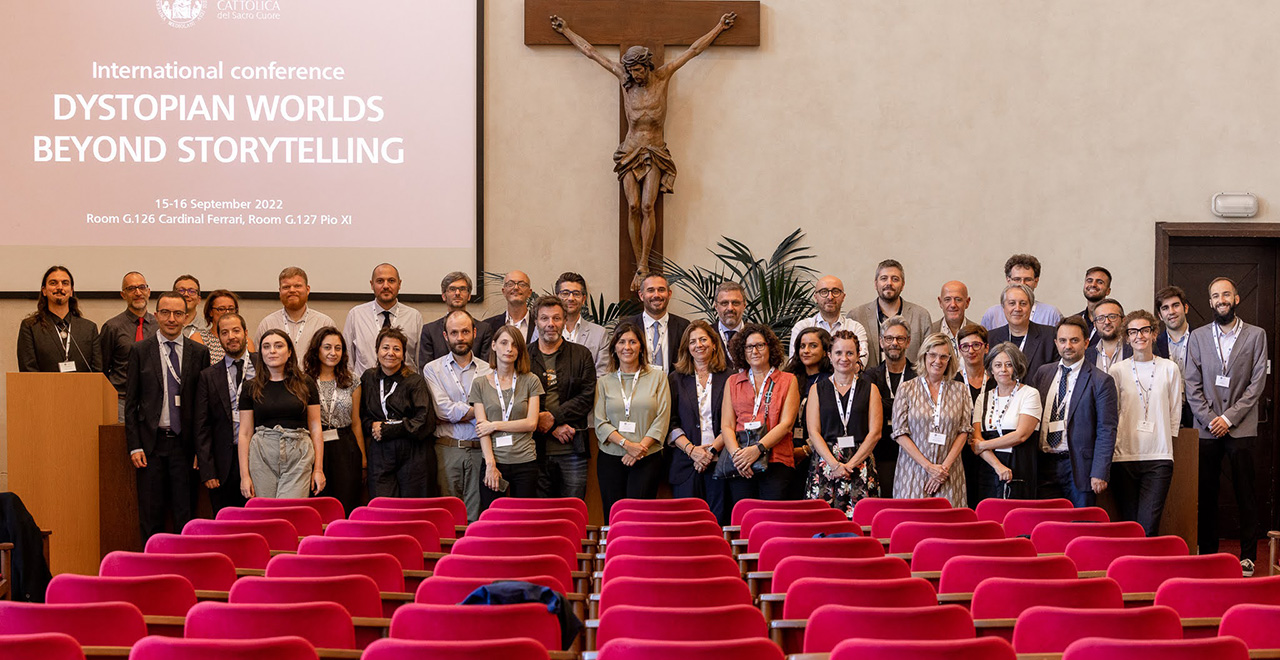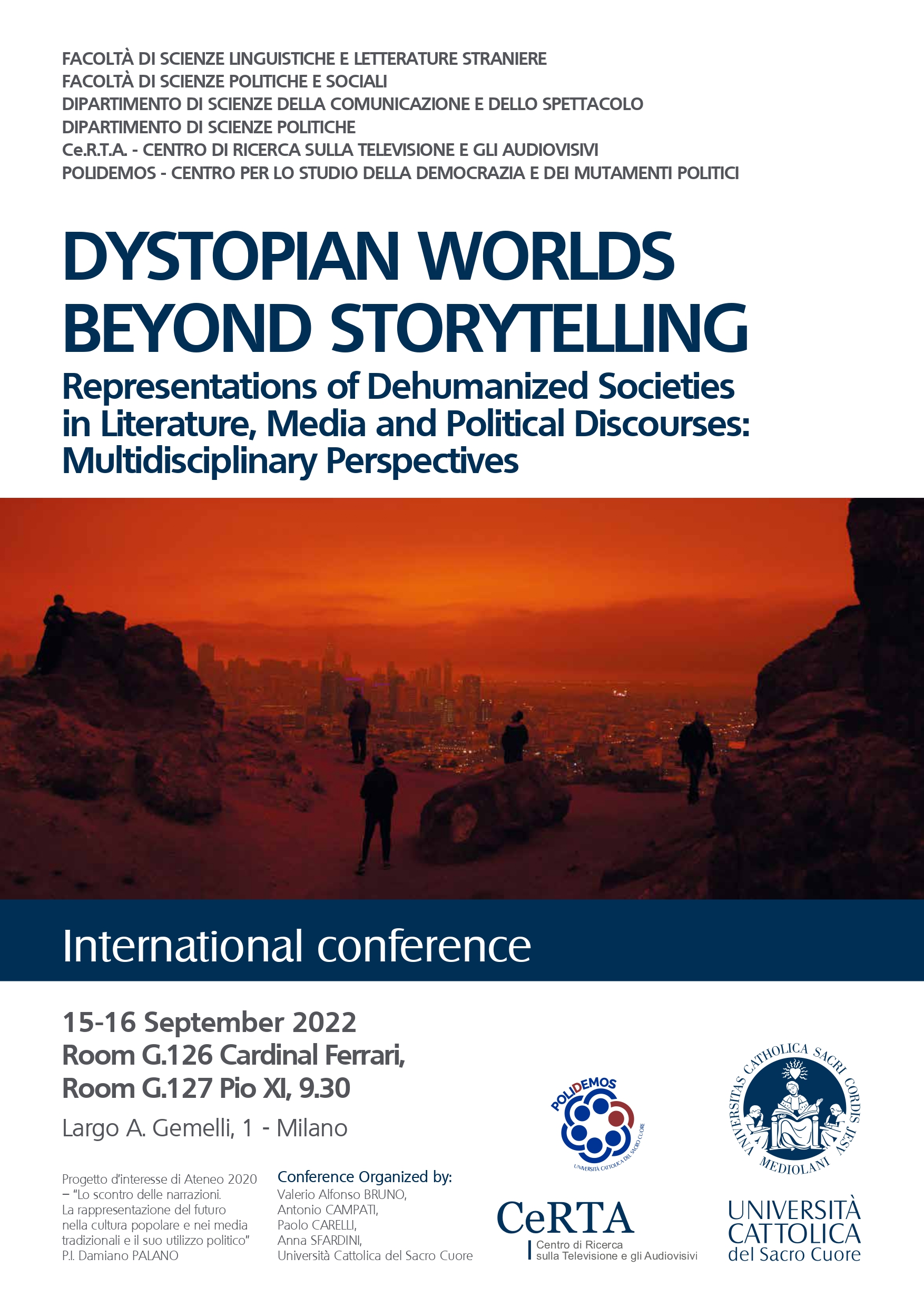- Milano
- Centro di Ricerca sulla Televisione e gli Audiovisivi (Ce.R.T.A.)
- Notizie
- Dystopian Worlds beyond Storytelling | International Conference
Dystopian Worlds beyond Storytelling | International Conference

Facoltà di Scienze Politiche e Sociali
Facoltà di Scienze Linguistiche e Letterature Straniere
Dipartimento di Scienze della Comunicazione e dello Spettacolo
Dipartimento di Scienze Politiche
Ce.R.T.A. - Centro di Ricerca sulla Televisione e gli Audiovisivi
POLIDEMOS
INTERNATIONAL CONFERENCE
Dystopian Worlds beyond Storytelling.
Representations of Dehumanized Societies in Literature, Media and Political Discourses: Multidisciplinary Perspectives
Milano, 15-16 September 2022
Università Cattolica del Sacro Cuore
Room G.126 Cardinal Ferrari
Room G.127 Pio XI
Largo A. Gemelli, 1 - Milano
International Conference - flyer
Seminar - flyer
Mondi Distopici oltre lo Storytelling
Il fascino delle narrazioni distopiche
Conference Organized by
Valerio Alfonso Bruno, Università Cattolica del Sacro Cuore
Antonio Campati, Università Cattolica del Sacro Cuore
Paolo Carelli, Università Cattolica del Sacro Cuore
Anna Sfardini, Università Cattolica del Sacro Cuore
Scientific Committee
Gabriele Balbi (USI - Università della Svizzera Italiana), Giovanni Boccia Artieri (Università degli Studi di Urbino “Carlo Bo”), Arturo Cattaneo (Università Cattolica del Sacro Cuore), Luca Gino Castellin (Università Cattolica del Sacro Cuore), Fausto Colombo (Università Cattolica del Sacro Cuore), Chiara Continisio (Università Cattolica del Sacro Cuore), Ruggero Eugeni (Università Cattolica del Sacro Cuore), Guido Gili (Università degli Studi del Molise), Giacomo Manzoli (Alma Mater Studiorum – Università di Bologna), Alberto Marinelli (Sapienza Università di Roma), Andrea Minuz (Sapienza Università di Roma), Federica Missaglia (Università Cattolica del Sacro Cuore), Damiano Palano (Università Cattolica del Sacro Cuore), Francesca Pasquali (Università degli Studi di Bergamo), Enrico Reggiani (Università Cattolica del Sacro Cuore), Massimo Scaglioni (Università Cattolica del Sacro Cuore), Nicoletta Vittadini (Università Cattolica del Sacro Cuore), Maria Teresa Zanola (Università Cattolica del Sacro Cuore).
Local Organizing Committee
Edoardo Maria Castelli, Maria Grazia Contu, Nicola Crippa, Joyce Faelli, Mattia Galli
In the last two decades, media and cultural production has been characterized by an increasing representation of dystopian worlds and alternative and “possible universes”, as narrative tools to describe fears and contradictions of human beings face to the uncertainty of the future as well as the reworkings of the past and the memory. The pandemic emergence has accentuated this particular creative process, not only in the direction of health and epidemiological topics, but – more in general – towards a reconfiguration of new imageries about catastrophes and other social, cultural and technological upheavals. As part of a wider project on the so-called “clash of narratives” and its media representation and political use and mobilization, carried out by Università Cattolica del Sacro Cuore also through the project of an “Atlas of dystopian storytelling” (www.unicatt.it/atlantedistopiemediali), the International Conference aims to focus, from a strong multidisciplinary perspective - including media, political, literary, linguistic, sociological and cultural studies - on the various ways the theme of dystopia has become relevant and massive in contemporary popular culture, both in traditional and digital forms, highlighting how it has changed across different languages and formats, also in the direction of a strong transmediality (novels, comics, movies, TV series, videogames, digital and social platforms, political discourses and so on). Dystopic societies have always been present in literature, film and media studies, but there is no doubt that they heavily emerged in recent cultural production as the result of deep social and political transformations that occurred in Western and non-Western societies after the collapse of twentieth-century ideologies and traumatic events – such as the attack on the Twin Towers or the current pandemic crisis. Thus, new narratives have emerged, often representing neo-populist or conspiracy theories on one hand, and apocalyptic future or “parallel present” on the other. The scenario of popular culture products reflects and also forges contemporary fears and anxieties within a society characterized by the domain of the technique, migrations and nomadic processes, democratic and environmental crisis, health emergencies; all aspects that underline the fragility of our societies and reconfigure concepts of space (production and representation of places, both real and fictional) and time (the role of past, present and future in dystopic media narratives), providing a cartography of complex trajectories and hybridizations of media, genres, and discourses of dystopias in popular culture and social practices.
